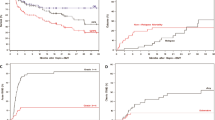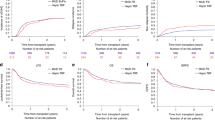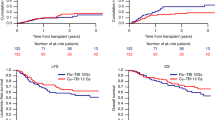Summary:
A total of 81 adults with acute myeloid leukemia (AML) (47% favorable karyotypes) were autografted in first remission after melphalan–total body irradiation, having received 0 (n=7), 1 (n=19), 2 (n=51), or 3 (n=4) consolidation chemotherapy cycles before harvest. The cumulative 5-year incidences of relapse and transplant-related mortality were 37 and 17%, respectively. The actuarial 5-year probability of disease-free survival (DFS) was 46%. In Cox analysis, favorable karyotypes, increasing numbers of consolidation cycles (0 vs ⩾1 or 1 vs >1), and higher nucleated cell doses were associated with lower relapse rates and higher DFS. Patients with favorable karyotypes benefited from every additional cycle of consolidation therapy (0 vs ⩾1 as well as 1 vs >1). Among patients with other karyotypes, while the benefit of one cycle of consolidation was clear (0 vs ⩾1), there was no obvious beneficial impact of further consolidation therapy (1 vs >1). Administration of consolidation chemotherapy prior to harvest is essential in AML. While it is possible to enhance the benefit of consolidation with favorable karyotypes by delivering two cycles, its usefulness is limited in others. In them, it may be worthwhile exploring alternatives not normally used in AML (eg high-dose cyclophosphamide) that could have antileukemic effects while permitting mobilization of stem cells
This is a preview of subscription content, access via your institution
Access options
Subscribe to this journal
Receive 12 print issues and online access
$259.00 per year
only $21.58 per issue
Buy this article
- Purchase on Springer Link
- Instant access to full article PDF
Prices may be subject to local taxes which are calculated during checkout






Similar content being viewed by others
References
Grimwade D, Walker H, Oliver F et al. The importance of diagnostic cytogenetics on outcome in AML: analysis of 1,612 patients entered into the MRC AML 10 trial. The Medical Research Council Adult and Children's Leukaemia Working Parties. Blood 1998; 92: 2322–2333.
Burnett AK, Goldstone AH, Stevens RM et al. Randomised comparison of addition of autologous bone-marrow transplantation to intensive chemotherapy for acute myeloid leukaemia in first remission: results of MRC AML 10 trial UK Medical Research Council Adult and Children's Leukaemia Working Parties. Lancet 1998; 351: 700–708.
Mehta J, Powles R, Singhal S et al. Autologous bone marrow transplantation for acute myeloid leukemia in first remission: identification of modifiable prognostic factors. Bone Marrow Transplant 1995; 16: 499–506.
Mayer RJ, Davis RB, Schiffer CA et al. Intensive postremission chemotherapy in adults with acute myeloid leukemia. N Engl J Med 1994; 331: 896–903.
Bloomfield CD, Lawrence D, Byrd JC et al. Frequency of prolonged remission duration after high-dose cytarabine intensification in acute myeloid leukemia varies by cytogenetic subtype. Cancer Res 1998; 58: 4173–4179.
Byrd JC, Dodge RK, Carroll A et al. Patients with t(8;21)(q22;q22) and acute myeloid leukemia have superior failure-free and overall survival when repetitive cycles of high-dose cytarabine are administered. J Clin Oncol 1999; 17: 3767–3775.
Powles R, Milan S, Horton C et al. The Royal Marsden Hospital leukemia-myeloma database: an ‘operations research’ resource for assessing clinical outcomes and planning new drug trials. Blood 2001; 98: 426a (Abstract).
Hann IM, Stevens RF, Goldstone AH et al. Randomized comparison of DAT versus ADE as induction chemotherapy in children and younger adults with acute myeloid leukemia. Results of the Medical Research Council's 10th AML trial (MRC AML10) Adult and Childhood Leukaemia Working Parties of the Medical Research Council. Blood 1997; 89: 2311–2318.
Mehta J, Powles R, Treleaven J et al. The impact of karyotype on remission rates in adult patients with de novo acute myeloid leukemia receiving high-dose cytarabine-based induction chemotherapy. Leuk Lymphoma 1999; 34: 553–560.
Mehta J, Powles R, Horton C et al. Factors affecting engraftment and hematopoietic recovery after unpurged autografting in acute leukemia. Bone Marrow Transplant 1996; 18: 319–324.
Powles R, Sirohi B, Frassoni F et al. Bone marrow or peripheral blood stem cell autotransplantation for acute myeloid leukemia in first remission? a matched-pair analysis from the Royal Marsden Hospital and the European Blood and Marrow Transplant Group (EBMT). Blood 2001; 98: 397b–398b (Abstract).
Zittoun RA, Mandelli F, Willemze R et al. Autologous or allogeneic bone marrow transplantation compared with intensive chemotherapy in acute myelogenous leukemia European Organization for Research and Treatment of Cancer (EORTC) and the Gruppo Italiano Malattie Ematologiche Maligne dell'Adulto (GIMEMA) Leukemia Cooperative Groups. N Engl J Med 1995; 332: 217–223.
Harousseau JL, Cahn JY, Pignon B et al. Comparison of autologous bone marrow transplantation and intensive chemotherapy as postremission therapy in adult acute myeloid leukemia The Groupe Ouest Est Leucémies Aiguës Myéloblastiques (GOELAM). Blood 1997; 90: 2978–2986.
Cassileth PA, Harrington DP, Appelbaum FR et al. Chemotherapy compared with autologous or allogeneic bone marrow transplantation in the management of acute myeloid leukemia in first remission. N Engl J Med 1998; 339: 1649–1656.
Wheatley K, Burnett AK, Goldstone AH et al. A simple, robust, validated and highly predictive index for the determination of risk-directed therapy in acute myeloid leukaemia derived from the MRC AML 10 trial. Br J Haematol 1999; 107: 69–79.
Mehta J, Powles R, Sirohi B et al. Excellent results of unpurged autotransplantation in first-remission acute myeloid leukemia with t(8;21), inv(16), and t(15;17). Blood 2002; 100: 860a (Abstr 3391).
Acknowledgements
This study was supported by the Bud Flanagan Leukaemia Fund, the David Adams Leukaemia Fund, the Cancer Research Campaign, and the Institute of Cancer Research.
Author information
Authors and Affiliations
Rights and permissions
About this article
Cite this article
Mehta, J., Powles, R., Sirohi, B. et al. Impact of cytogenetics on the outcome of autotransplantation for acute myeloid leukemia in first remission: is the benefit of intensive pretransplant therapy limited to patients with good karyotypes?. Bone Marrow Transplant 32, 157–164 (2003). https://doi.org/10.1038/sj.bmt.1704119
Received:
Accepted:
Published:
Issue Date:
DOI: https://doi.org/10.1038/sj.bmt.1704119
Keywords
This article is cited by
-
High-dose chemotherapy and autologous hematopoietic stem cell transplantation in myeloma patients under the age of 65 years
Bone Marrow Transplantation (2007)
-
Long-term outcome after intensive therapy with etoposide, melphalan, total body irradiation and autotransplant for acute myeloid leukemia
Bone Marrow Transplantation (2004)
-
High-dose melphalan and autotransplantation followed by post transplant maintenance chemotherapy for acute lymphoblastic leukemia in first remission
Bone Marrow Transplantation (2004)



